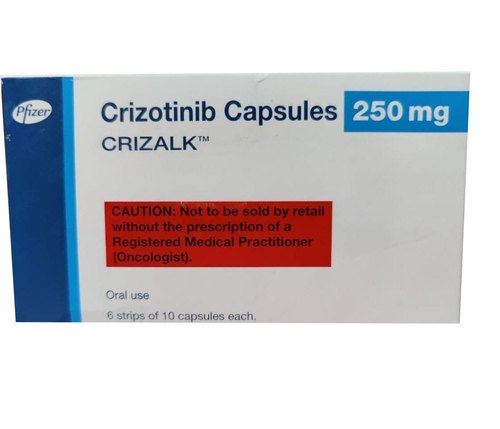Crizotinib: a new treatment option for non-small cell lung cancer
- Non-small cell lung cancer (NSCLC) is one of the most common types of lung cancer. It accounts for about 85% of all cases of lung cancer.
- NSCLC is usually diagnosed when the disease has spread beyond the lungs.
- Most patients with advanced stage NSCLC have a poor prognosis.
- A new drug called crizotinib may be an effective treatment for these patients.
- In this article we’ll discuss what crizotinib is, its mechanism of action, and how it works.

What is Crizotinib?
Crizotinib (Xalkori) is a targeted therapy approved by the FDA for treatment of patients with advanced ALK-positive non-small cell lung cancers who have progressed after prior chemotherapy.
Non-small cell lung cancer (NSCLC) accounts for 85% of all lung cancer diagnoses. The majority of these tumors contain activating mutations in the anaplastic lymphoma kinase (ALK). These mutations result in constitutive activation of the receptor tyrosine kinase ALK, leading to uncontrolled proliferation of tumor cells. In 2013, the FDA approved crizotinib (XALKORI), a drug that targets the ALK protein.
Crizotinib has shown significant clinical benefit in patients with ALK-rearranged NSCLC. This review provides an overview of the current evidence supporting its use in the management of ALK-positive NSCLC.
Crizotinib
Crizotinib is a targeted therapy drug that was approved by the FDA in August 2011 for the treatment of patients with advanced ALK+ NSCLC who have progressed after prior chemotherapy. Crizotinib inhibits the activity of anaplastic lymphoma kinase (ALK) protein, which is involved in tumorigenesis of certain cancers including those of the central nervous system, thyroid gland, and kidney.
Non-Small Cell Lung Cancer (NSCLC)
Non-small cell lung cancer (NSCLC) accounts for about 85% of cases of lung cancer. NSCLC includes three major subtypes: adenocarcinomas, squamous cell carcinomas, and large cell carcinomas. Adenocarcinomas account for 40%-50% of NSCLCs; squamous cell carcinomas account for 30%-40%; and large cell carcinomas account for 10%-20%. Squamous cell carcinomas tend to occur in older men, while adenocarcinoma tends to occur in younger individuals. Large cell carcinomas tend to affect women more often than men.
Anaplastic Lymphoma Kinase (ALK)
Anaplastic lymphoma kinas (ALK) is a receptor tyrosine kinase that belongs to the insulin receptor family. In normal cells, ALK is expressed only at low levels. However, in many types of cancer, including non-small cell lung cancers, ALK is overexpressed. Overexpression of ALK may result from gene amplification, mutation, or translocation.
Targeted Therapy Drugs
Targeted therapies are drugs designed to target specific molecules or pathways involved in disease processes. These drugs are generally less toxic than traditional cytotoxic chemotherapies. Targeted therapies are particularly useful for treating cancer because they allow for greater specificity and selectivity in targeting cancer cells compared to conventional chemotherapies.
Progression Free Survival (PFS)
Progression free survival (PFS) is defined as the time between randomization and first evidence of disease progression or death due to any cause. PFS is commonly measured in clinical trials as a primary endpoint.
Adverse Events
Adverse events (AEs) are side effects associated with the use of a medication. AEs can range from mild to severe. Commonly reported adverse events include nausea, vomiting, diarrhea, fatigue, rash, headache, constipation, dry skin, dizziness, insomnia, cough, dyspnea, back pain, abdominal pain, arthralgia, myalgia, peripheral edema, hypertension, hypotension, hypokalemia, hyperkalemia, hyponatremia, hypernatremia, hypocalcemia, hypercalcemia, hypoglycemia, hyperglycemia, hypothyroidism, hyperthyroidism, weight loss, increased appetite, decreased appetite, pruritus, urticaria, alopecia, acne, eczema, dermatitis, nail disorder, hair disorder, and others.
Clinical Trials
Clinical trials are studies conducted to evaluate the safety and effectiveness of investigational drugs or medical devices. Clinical trials are regulated by the U.S. Food and Drug Administration (FDA).
In conclusion, crizotinib is a targeted therapy that inhibits anaplastic lymphoma kinase (ALK). ALK is a protein that plays a role in tumor growth and metastasis. This drug is approved by the FDA for treating patients with certain types of non-small cell lung cancers.
